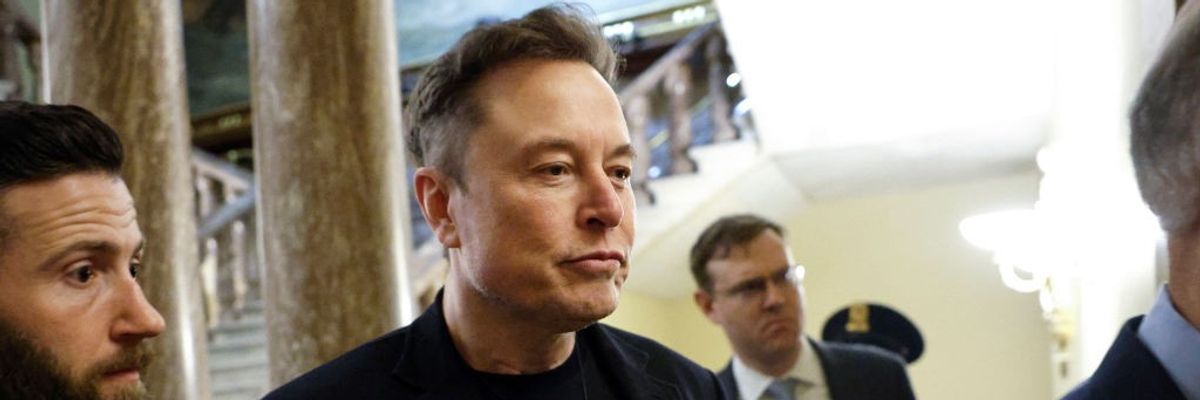Elon Musk’s political and cultural influence—once feared as dystopic, transformative, and totalizing—is beginning to resemble a flash in the pan.
Not long ago, Musk seemed poised to remake the world—or at least to meme it into submission. His presence felt not only pervasive but inescapable. He was the heir apparent to techno-authoritarian chic: a “dark MAGA” demigod in a zip-up jacket, preaching a gospel of Martian salvation and machine-learning rapture.
But today, his standing is slipping. Recent reports suggest Musk has fallen out with U.S. President Donald Trump’s inner circle. Cabinet members reportedly clashed with him over his interference in federal agencies; others took him to task for rogue public statements. He drew further public ire for what many saw as a graceless and callous approach to mass firings. Polls show that while many Americans still express interest in Dogecoin, they overwhelmingly disapprove of Musk at the helm.
Unlike traditional MAGA, Musk’s vision doesn’t look backward into the past. It projects forward—into the void.
Then came his public rebuke in Wisconsin, where a $20 million effort to influence a state Supreme Court election—complete with Musk handing out million-dollar checks at a rally—was soundly rejected by voters. All the while, Tesla faced mounting scrutiny from regulators, and average Americans started attacking the cars themselves.
Now, his jokes have gone stale. X (formerly Twitter) is drifting into irrelevance, and his once-magnetic pull over public discourse feels more like static than signal. The man who once stormed a stage wielding a chainsaw is now being quietly uninvited from the party.
But if this does mark the end of Musk’s political career, it shouldn’t be remembered as a sideshow. Musk represents a recurring fantasy: a transgenerational techno-messianic dream that imagines salvation through systems, transcendence through circuitry.
To understand Musk’s rise and fall, it helps to look backward—specifically, to his grandfather, Joshua Haldeman. A Canadian chiropractor and political dreamer, Haldeman led the Canadian chapter of Technocracy Inc., a gray-uniformed movement in the 1930s that believed engineers—not politicians—should rule the world. It was a post-democratic fantasy of optimized control, an early prototype of what we now call algorithmic governance.
When that didn’t pan out, Haldeman joined the Social Credit movement around the time its Quebec chapter began promoting The Protocols of the Elders of Zion and flirting with homegrown fascism. Censured and disillusioned, he moved his family to apartheid South Africa, a country he praised in his writings as a stronghold of Western Christian values and white self-governance. There, Musk’s father, Errol, built wealth through engineering and real estate ventures, and later acquired part ownership in an emerald mine in Zambia.
Elon Musk inherited this worldview and polished it. His own techno-utopianism is just a shinier version of this old settler dream. The medium changed. But the fantasy didn’t.
Unlike traditional MAGA, Musk’s vision doesn’t look backward into the past. It projects forward—into the void. His vision is of a world run by smart people and smarter machines, with little room for emotional irregularity, biological vulnerability, or democratic friction. In this model, emotion is treated as a bug. The body becomes obsolete.
It’s not just Musk. His outlook is broadly shared among a certain class of technocratic elites who, despite appearing ideologically opposed, converge on a shared goal: the construction of a post-human world. Whether framed as innovation, inevitability, or progress, the underlying premise is the same—merge biology with technology, and minimize the complications of the human condition.
Klaus Schwab, the recently investigated (and likely former) head of the World Economic Forum—and an advocate of implantable microchips—summarized this new paradigm in a 2022 interview with Swiss broadcaster RTS: “In this new world, we must accept transparency—total transparency. You have to get used to it. It must become integrated into your personality.” He added, “But if you have nothing to hide, you shouldn’t be afraid.”
That same year, Yuval Noah Harari, a senior advisor to the WEF, declared: “We are now hackable animals… The idea that we have a soul, this spirit, and free will—that’s over.”
As the AI wave crested, the tech industry followed suit. Meta launched a child-friendly AI therapist. Microsoft patented chatbot technology to simulate the dead. Apple’s VisionOS 3.0 began muting family group chats based on an “emotional volatility index.” Emotional honesty gave way to managed vibes.
Amid it all, Musk tweeted: “It has become increasingly clear that humanity is the biological bootlicker of AI.” A curious comment from a man who has actively helped to tighten the laces.
But now, the music seems to have stopped. Musk appears increasingly out of step with the moment. For all his bluster and noise, he never figured out how to meet people where they are.
Utopian tech visions rarely do. They tend to hover above the friction of daily life—above labor, land, and limits—before, inevitably, they come crashing back to Earth.
